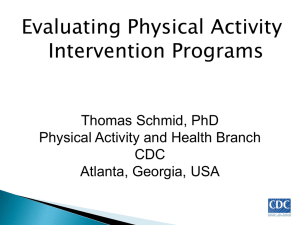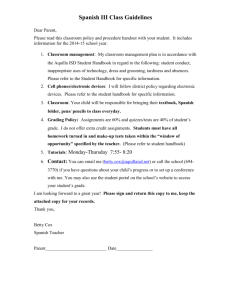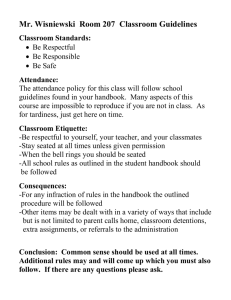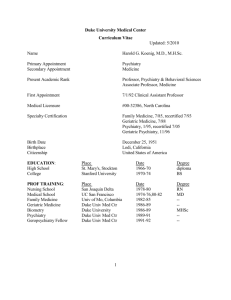Palmer School of Library and Information Science
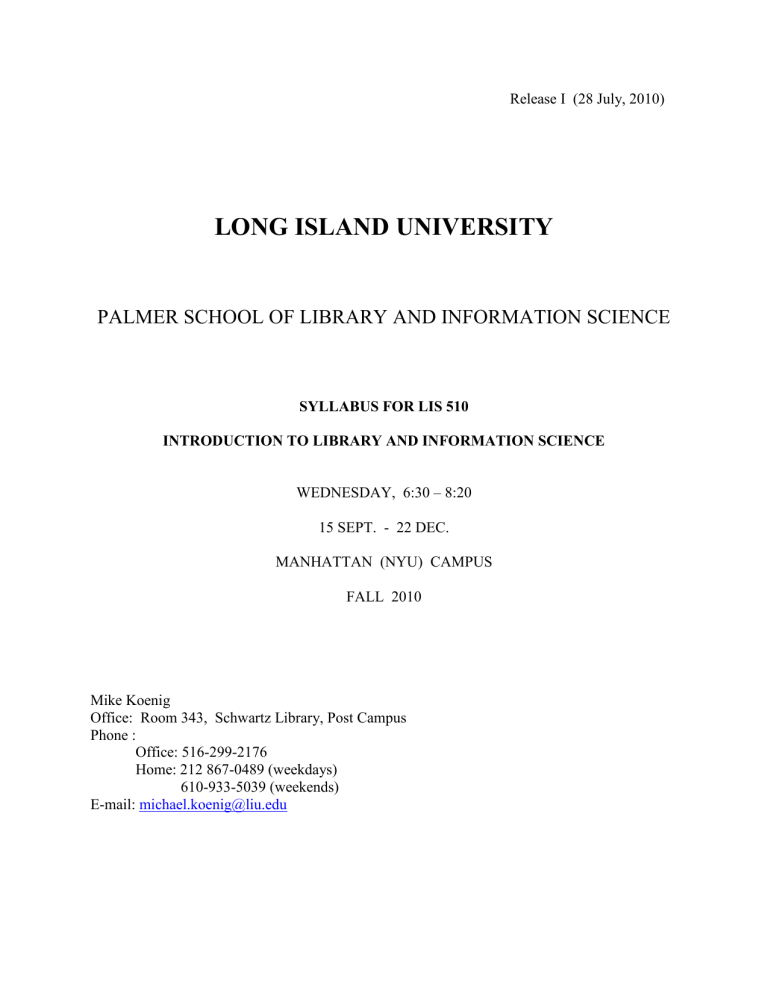
Release I (28 July, 2010)
LONG ISLAND UNIVERSITY
PALMER SCHOOL OF LIBRARY AND INFORMATION SCIENCE
SYLLABUS FOR LIS 510
INTRODUCTION TO LIBRARY AND INFORMATION SCIENCE
WEDNESDAY, 6:30 – 8:20
15 SEPT. - 22 DEC.
MANHATTAN (NYU) CAMPUS
FALL 2010
Mike Koenig
Office: Room 343, Schwartz Library, Post Campus
Phone :
Office: 516-299-2176
Home: 212 867-0489 (weekdays)
610-933-5039 (weekends)
E-mail: michael.koenig@liu.edu
Course Description: LIS 510 Introduction to Library and Information Science
Overview of the field, rather broadly defined. Introduction to the history, purpose, functions, and processes of the field, its place in society, practice of the profession in various types of settings, concepts underlying the field, and current issues and trends. (3 credits)
Technology:
Working knowledge of basic computer applications and word processing.
Palmer School objectives met by this course:
articulate the mission of the library and information professional in the context of the constituency served;
identify the information needs of society through the application of principles of organization, selection, and evaluation of information resources;
exhibit comprehension of the varied missions and organizational patterns in libraries and information agencies and their inter-relationships;
recognize the importance of the contributions of other fields of knowledge to the profession, of ethical behavior, and commitment to the ideals of intellectual freedom.
Course Objectives:
To provide a broad understanding of the field of library and information science.
To facilitate the exploration of the rich possibilities of practice in the field.
To convey a basic understanding of the challenges and requirements for information transfer, and for knowledge organization and management in various information environments.
To develop a conceptual framework for understanding the relations between technological developments and the changing nature of the profession.
To establish an awareness of the primary ethical and policy issues of the library and information professions.
To develop an awareness of the literature of library and information science, and the diversity of scholarly and research activity.
ASSIGNMENTS, EXAMS, AND CRITERIA FOR GRADING
1) Readings – Readings should be completed before the class session
2) Class Participation – (20%) – Regular attendance is required. Class participation is expected. Don’t just sit like a sponge soaking it up!
3) Class Assignments (Handed out in class) – 25%
4) Term Paper – (30%) – Choose an issue of concern to the field of library and information science (broadly defined).
Start thinking about this early on . The end of tern is always a crunch time with papers and exams, usually for more than one course. The earlier you start on this assignment, the less stressed you will be later. By all means pick something that piques your interest or that you are curious about. The topic should be discussed with the instructor (face-to-face, email, phone) before launching far into your research. The paper is due Friday December 15th , the next to last session, as you will be reporting on your topic in either of the last two sessions. The paper should commence with a one page executive summary . The paper should normally not exceed 4,000 words (exclusive of the executive summary).
5) Final Examination – (25%) - A Take Home exam
Estimates / Guidelines for Deployment of Non-Class Hours
Reading
Term (Research paper) Paper
Class Assignments
85 hours
40 hours
20 hours
TEXTBOOK
and READINGS:
The Whole Library Handbook 4 compiled by George M. Eberhart, American Library
Association, Chicago and London, 2006. ISBN 0-8389-0915-9.
Other References: See under Topics
There will also be a number of generally brief readings from the International Encyclopedia of
Information and Library Science, 2nd edition, John Feather and Paul Sturges, eds. Routledge,
London and New York, 2003.
SCHEDULE OF TOPICS AND ASSIGNED READINGS
Note, the course starts on Wednesday, September 15th.
Note also that this schedule is not cast in Bronze. We will probably have a guest lecturer or two, and that will probably require some adjustment. Stay loose, and get and stay ahead on the readings . The instructor is likely to ask you for your reactions.
Note - the precise sequence will vary depending upon the availability of guest speakers and other factors.
Cluster 1 - Introduction, including:
Types of Libraries, Information Centers, Information Intensive
Operations, Information Industry, and their Purposes and Goals.
Sessions 1-3
The “Libraries” section of The Whole Library Handbook 4, pp 2 – 70.
Browse through the “People” Chapter in The Whole Library Handbook 4 (pages 72 –
138).
Bates, Marcia J. 2006. Fundamental Forms of Information. Journal of the American
Society for Information Science and Technology 57: 1033-45.
The Academic Libraries, Special Libraries, Public Libraries, School Libraries, Rare book
Libraries, Archives, Knowledge Industries, & Economics of Information entries in the International Encyclopedia of Information and Library Science, 2nd edition,
John Feather and Paul Sturges, eds. Routledge, London and New York, 2003.
Williams, Patrick, “How Should the Public Library Respond to Public Demand?” Library
Journal 115, Oct 14 1990: 54-56
Drucker, Peter F. “The Age of Social Transformation”, The Atlantic Monthly, 274 (11):
53-80, Nov. 1994. (A marvelously insightful essay on the importance of information in the future.)
You will be asked to select and visit a library, and write a brief report on it . A how-to / prompting sheet will be distributed in class. If you are already affiliated with a library or information center, pick an institution of a different type.
Cluster 2
-
Knowledge Management; History and Dynamics of Information and
Knowledge Use and Creation, The Net & Scholarly Communications,
Sessions 4-6
Koenig, Michael E. D. and Neveroski, Ken , "The Origins and Development of
Knowledge Management”, Journal of Information and Knowledge Management,
7(4): 243-254, December 2008.
The “Operations” Section (pages 280 -368) of The Whole Library Handbook 4
(note the section on Metadata by Arleen Taylor, pages 303 -313)
Knowledge Management, Information Management, Organization of Knowledge, &
Information Seeking Research entries in the International Encyclopedia of
Information and Library Science
Merton, Robert K. “The Mathew effect in Science”, Science, Vol. 159, pp. 56-63, 1968.
A Classic.
Browse through the “Materials” Chapter in The Whole Library Handbook 4 (pages 210 –
278).
Katz, Bill “A Protohistory of Bibliography” pages 278-282 in The Whole Library
Handbook 3 (class handout).
Brooks, Sandy “A History of the Card Catalog”, from the Whole Library
Handbook 3, pages 311-314 (class handout).
Koenig, Michael E.D. Information Driven Management – Concepts and Themes:
A Toolkit for Librarians, IFLA publication #86, Munich, K.G. Saur, 1998.
Davenport, Thomas H. & Prusak, Laurence (Larry), with Wilson, H.
James, What’s The Big Idea? Creating and Capitalizing on the Best
Management Thinking, Cambridge, Harvard Business School Press, 2003.
Stewart, Thomas. “Your Company’s Most Valuable Asset: Intellectual Capital.”
Fortune 130 (Oct. 3, 1994): 68-74.
Price, Derek J. DeSolla. Little Science, Big Science. New York, Columbia
University Press, 1963. An essay really, published as a book. A classic.
You will be asked to select and “visit” several library Portals or OPACs (Online Public
Access Catalogs), and write a brief contrast and compare report on them.
A how to / prompting sheet will be distributed in class
Cluster 3 - History of Information Technology & Fundamentals of Digital
Information Storage
Sessions 7-9
The “Technology” Section (pages 417 -456) of The Whole Library Handbook 4
Search Engines, Information and Communication Technology, & Informatics, entries in
International Encyclopedia of Information and Library Science
Koenig, Michael E. D. “Data Relationships, Information Retrieval Systems and Database
Management Systems” Information Technology and Libraries, 4 (3):247- 272,
Sept. 1985. (Class Handout)
Kilgour, Frederick G. “Origins of Coordinate Searching”, JASIS (Journal of the
American Society for Information Science) 48 (4): 340-348, April 1997.
Koenig, Michael E. D. “Entering Stage III – The Convergence of the Stage Hypotheses”,
JASIS (Journal of the American Society for Information Science) 43 (3):
204- 209, April 1992.
Cluster 4 - Information Policy Issues and Professional Issues
Sessions 10 -12
The “Issues” Section (pages 458 -514) of The Whole Library Handbook 4
Information Policy, Organizational Information Policies, Information Ethics, Information
Professions, Copyright, Censorship, & Privacy entries in the International
Encyclopedia of Information and Library Science
Pico, Steven (of Island Trees fame) “An Introduction to Censorship” School Library
Media Quarterly (Winter 1990)” 84-87.
Koenig, Michael & Sione, Patrizia “The World at Stage III, but the Net at Stage II”
JASIS (Journal of the American Society for Information Science) 48(9): 853-859,
Sept. 1997.
Keyes, Alison M. “The Value of the Special Library: Review and Analysis”, Special
Libraries 86(3):172-187, Summer 1995.
Unsworth, Michael E. “Freedom of Information” in The Whole Library Handbook 3
(pages 233-237)
Cluster 5 - Presentations on Term Paper Topics
Session 13 & 14





